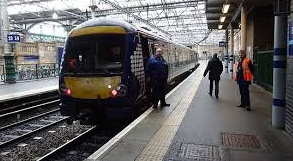
Boris Johnson calls for unions to reconsider their stance, warning that strikes will harm passengers, businesses, and the economy.
As a nationwide rail strike looms, Prime Minister Boris Johnson is set to call for a “pragmatic compromise” to prevent disruption to millions of passengers. The proposed industrial action, set to affect services this week, is the culmination of a long-running dispute between rail unions and employers over pay, jobs, and working conditions.
Johnson is expected to argue that unions are “hurting the very people they claim to help” by moving forward with the largest wave of industrial action on the railways in a generation. Ahead of a Cabinet meeting on Tuesday, he will urge both sides to find a balanced solution that protects workers’ rights while preventing further chaos for the public.
The strikes, led by the Rail, Maritime and Transport (RMT) union, are set to take place on Tuesday, Thursday, and Saturday. Services across the UK will be severely impacted, with only one in five trains operating on strike days, mainly on major routes and for a limited 11-hour window.
Despite ongoing negotiations on Monday evening, the deadlock remains, with both sides blaming each other for the lack of progress. Culture minister Chris Philp criticised the RMT for disrupting critical services, warning that the strikes would affect patients seeking medical care and children unable to attend exams.
However, RMT general secretary Mick Lynch rejected these accusations, accusing the government of “spreading nonsense” and insisting that his union was committed to negotiations. He stated that any potential settlement hinges on an offer that addresses key issues, but so far, no such proposal has been made.
Lynch’s criticisms also extended to the Prime Minister’s comments regarding the state of the rail industry. Johnson had argued that “outdated working practices” and excessive pay demands were putting financial strain on passengers, but Lynch countered by highlighting the technological advancements and modern agreements the union had secured in past years.
The union leader also pointed to the government’s £4 billion funding cuts to National Rail and Transport for London, accusing ministers of actively preventing a resolution by demanding job cuts and offering wages below the current inflation rate.
The Department for Transport (DfT), however, disputed these claims, stating that no £4 billion cuts had been made, instead attributing financial difficulties to reduced passenger numbers during the pandemic. The DfT also emphasised that decisions on job cuts were made by individual employers, not the government.
As the dispute drags on, the Prime Minister is expected to emphasise the broader economic implications of the strike, urging a sensible resolution to avoid inflating the cost of living. Johnson will warn that excessive pay demands would worsen the economic challenges facing families, particularly with inflationary pressures continuing to rise.
No 10 confirmed that the Prime Minister, alongside Chancellor Rishi Sunak, would discuss the need for public sector pay restraint in the context of rising inflation. Johnson has already stressed that any pay rises must be proportional and should not fuel further inflation.
In addition to the immediate threat of rail strikes, Johnson’s Cabinet meeting will also focus on addressing broader economic concerns, with warnings that unchecked inflation could lead to long-term damage for public finances.












